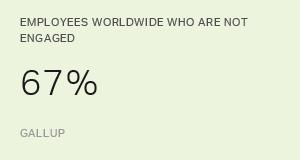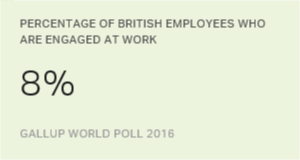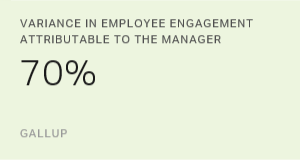This is the first article in a two-part series.
In the 21st century, why do some organizations and economies thrive and grow while others struggle and often fail? Gallup's new State of the Global Workplace report takes a big-picture approach to this question, examining the effectiveness with which governments and employers worldwide develop and deploy the most vital and sustainable resources available to them: the skills, talents and creativity of their people.
The need to make better use of the human capital in organizations -- from small businesses to entire societies -- has never been more evident than in the years since the Great Recession. Perhaps the biggest takeaway from the worldwide economic slowdown is that what globalization giveth, it can also taketh away. Leaders worldwide faced the realization that to cushion against the severe shocks that can come with global boom-and-bust cycles, they need to diversify their economies and better use the untapped potential within their populations. Consider the following situations discussed in the report:
- The period between 2000 and 2008 saw flourishing economies in much of Latin America, as the region's largest countries exported commodities like oil, copper and soybeans. However, the boom came to an abrupt halt when the recession and China's slowing growth sharply reduced global demand for these exports. The bust left governments in the region subject to criticism for not investing more in long-term, human-capital-based growth by expanding access to healthcare, education and vital infrastructure. Overall, 42% of residents in Latin America say they are satisfied with the availability of quality healthcare in their area, one of the lowest regional figures in the world.
- Some countries that had been labeled "emerging markets" for their rapid growth in the early years of this century experienced a similar slowdown when copious flows of foreign direct investment (FDI) mostly dried up during the recession. Those with large current-account deficits, including several in Eastern Europe, suffered the most. Countries in that region urgently need to generate more reliable, organic sources of growth to help stem the flow of emigrants to the West. Overall, 24% of Eastern European residents -- including 41% of those aged 15 to 29 -- say they would like to move permanently to another country.
- In the Middle East, recent years have made it clear that the global thirst for oil is not boundless. Record-low oil prices have been accompanied by concerted efforts to prepare for a future in which the world is no longer as reliant on fossil fuels. Further, alarmingly high levels of youth unemployment have led even the region's wealthiest governments to make private-sector job growth a priority. It's an uphill battle in places where, for decades, oil revenues have reduced the need for infrastructure that supports human capital development. Many residents are accustomed to seeking undemanding public-sector jobs; regionwide, 58% say they would rather work for the government than for a business.
The good news is that there's vast room for improvement. Gallup research evaluates factors that promote human capital development at multiple levels -- including efforts that apply to entire societies, those made by specific employers and those intended to help individuals promote their own development.
Society level: Society-level supports are mostly in the public policy domain; responsible governments lay the foundation for human capital development by guaranteeing security and rule of law and ensuring equitable access to essential services such as education and healthcare. Public-private partnerships often expand access to these and other vital supports such as financial and IT services.
Some supports require coordinated efforts at the societal and organizational levels. Examples include support for new business startups and education-workforce ties such as internships.
Employer level: Employers play a vital role in developing human capital to maximize their productivity and growth. However, most of the world's businesses and organizations fall short in establishing these supports, resulting in wasted potential. The adaptation of organizational cultures to emphasize flexibility and continual learning and development represents a step in the right direction -- but it can't happen soon enough.
Unlocking human potential through personal development and a focus on individuals' innate strengths requires commitment by both employers and individuals.
Individual level: Supports for human capital development at the individual level include tools that promote self-awareness and strengths development as well as mentoring programs focused on things such as career development or financial health.
The benefits of maximizing human capital are clear from the macroeconomic level down to the lives of each citizen or employee. To the extent that the capacity of those around us expands, they are more likely to become customers of products we may be selling, or to provide high-quality services when we need them, or to come up with new ideas that improve our lives. Part two of this article will focus more specifically on employers' ability to make the most of their human capital by creating workplace cultures that maximize performance development and allow individuals to make the best use of their time and talents.
Learn more about Gallup's global workforce study and discover how your organization can tap into human capital and revitalize productivity.
- Download Gallup's State of the Global Workplace report.
- Register for the upcoming webinar to get vital insights directly from our workplace experts.
- Listen to our podcast featuring Jim Harter, Gallup's chief scientist of workplace management, to hear his thoughts on what workers worldwide need from their bosses.





